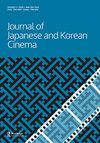Shamans and nativism: postcolonial trauma in Spirits’ Homecoming (2016) and Manshin: Ten Thousand Spirits (2013)
引用次数: 1
Abstract
ABSTRACT This article examines the figure of the shaman in contemporary South Korean cinema. By taking a close look at Cho Jung-rae (Jo Jeong-rae)’s feature Spirits’ Homecoming (Gwihyang, 2016) and Park Chan-kyong (Park Chan-gyeong)’s documentary Manshin: Ten Thousand Spirits (Mansin, 2013), the article argues that the figure of the shaman is deployed in such a way as to articulate South Korean postcolonial anxiety in two diverging ways. Whilst the former film draws on shamanism and nostalgizes the Korean past in relation to the issue of the ‘comfort women’ (military sex slaves) in contemporary South Korean politics, the latter eschews a coherent historical national narrative in favour of a more fragmented and interrogative account of not only South Korean shamanism but the country’s troubled relationship with the Korean War and the post-war modernization project. The article argues that where Cho Jung-rae’s film employs ethnocentrism as the primary lens for a nostalgic memory, Park Chan-kyong’s documentary disarticulates the historical trajectory of nationalist invocations of a shamanist past, as it aligns the nativist tradition with the wider pro-democracy minjung movement.萨满与本土主义:《精灵归乡》(2016)和《万灵》(2013)中的后殖民创伤
本文探讨了当代韩国电影中的萨满形象。通过仔细研究赵正来(赵正来)的故事片《精灵的归乡》(桂香,2016)和朴赞京(朴赞京)的纪录片《万神:万灵》(万辛,2013),本文认为,萨满的形象以这样一种方式被运用,以两种不同的方式表达了韩国的后殖民焦虑。前者借鉴了萨满教,怀旧了韩国过去与当代韩国政治中“慰安妇”(军中的性奴隶)问题的关系,后者回避了连贯的历史国家叙事,更倾向于对韩国萨满教以及该国与朝鲜战争和战后现代化项目的麻烦关系进行更碎片化和质疑性的描述。这篇文章认为,赵正来的电影将民族中心主义作为怀旧记忆的主要镜头,而朴赞敬的纪录片则将民族主义对萨满教过去的呼吁的历史轨迹分离开来,因为它将本土主义传统与更广泛的民主民正运动联系在一起。
本文章由计算机程序翻译,如有差异,请以英文原文为准。
求助全文
约1分钟内获得全文
求助全文
来源期刊

Journal of Japanese and Korean Cinema
Arts and Humanities-Visual Arts and Performing Arts
CiteScore
0.60
自引率
0.00%
发文量
16
期刊介绍:
Journal of Japanese and Korean Cinema is a fully refereed forum for the dissemination of scholarly work devoted to the cinemas of Japan and Korea and the interactions and relations between them. The increasingly transnational status of Japanese and Korean cinema underlines the need to deepen our understanding of this ever more globalized film-making region. Journal of Japanese and Korean Cinema is a peer-reviewed journal. The peer review process is double blind. Detailed Instructions for Authors can be found here.
 求助内容:
求助内容: 应助结果提醒方式:
应助结果提醒方式:


